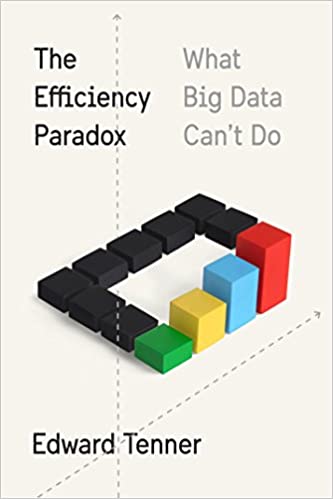Edward Tenner – The Efficiency Paradox Audiobook
Edward Tenner – The Efficiency Paradox Audiobook (What Big Data Can’t Do)

The Efficiency Paradox Audiobook Download
This publication ensures to take a look at the questionable effects of “big info efficiency” throughout all its variety– financial, political, and likewise truthful. We are living in a 2nd age of efficiency.
Why are people worldwide so discontented with their federal governments, so all set to aim to extreme solutions?
This book is an evaluation of something self- obviously more effective, even excellent, till it isn’t: efficiency. And likewise it’s likewise relating to an apparent oxymoron that appears silly up till we acknowledge that it’s in addition been important: influenced ineffectiveness. The Efficiency Paradox Audiobook Free. Efficiency is mainly outstanding yet, like all benefits, can be brought also much; even an additional of water can be hazardous … Considering that 2008, the desire for paradise by means of ever- increasing digital efficiency has actually been dimmed. Edward Tenner goes over simply how the debates of this “2nd age of [electronic] efficiency” observe back to the disputes of the “really first age” of mechanical efficiency, from the 1870’s to the 1930’s. As commercial economist Henry George composed in 1879: “The present century has actually been kept in mind by a prodigious increase in wealth- producing power. The usage of heavy steam and electrical energy, the introduction of enhanced treatments and labor- conserving devices, the much better neighborhood along with bigger variety of production, the exceptional support of exchanges, have actually increased immensely the efficiency of labor.
” However simply as such a location comprehends the issues which all civil areas are pursuing, and advancements in the variety of item development … so does hardship take a darker element. Some get a significantly better along with a lot easier living, nevertheless others find it difficult to get a living whatsoever. The “vagrant” features the engine, and likewise almshouses and likewise jails are as absolutely the marks of “material advancement” as are expensive houses, abundant storerooms, and likewise superb churches. Upon streets lighted with gas and likewise patrolled by uniformed cops, beggars wait for the passer- by, along with in the darkness of college, and likewise library, and museum, are gathering the more horrible Huns and fiercer Mischief- makers …”.
The monetary instability wrought by mechanical efficiency triggered culture to be lease by years of financial stress and anxieties where out of work mobs were triggered to difficulty and likewise improvement. Communism, fascism, world war, and likewise genocide were produced by individuals made desperate by “efficiency” causing mass joblessness. A brand name- brand-new Liberal Globalist world, led by the United States, emerged from the fight, and likewise revived success and likewise a type of order for 50 years. In addition to now some are verifying that the Liberal Globalist world is daunted by a “Populism” produced by the “second age” of computer system and likewise web efficiency. According to the losers of the 2016 elections, all that “phony news” apparently dispersing online factor Britons to Brexit and likewise Americans to Herald. Edward Tenner -The Efficiency Paradox Audio Book Download Or possibly the Britons Brexited and the Americans Trumpeted for other factors having absolutely nothing at all to do with computer system systems, the web, or counterfeit news? 2 questions, after that:.
Substantial questions: Did Britons and likewise Americans disobedience versus their Center elites given that they lost their tasks due to computer system automation and likewise were mad at being out of work?
Little questions: did Britons along with Americans revolt versus their Facility elites given that they were snookered by “phony news” online?
Tenner provides his sight of the “small concern.” He actually feels (as I do) that there was a dispersing of “counterfeit” info in the 2016 political elections, however that it was not likely to have in fact affected the outcomes.
However, that raises a larger point. The “counterfeit news” multiplied due to the reality that the Web has actually positioned people in direct contact with perspectives on a number of website that have actually not been vetted by the Facility Media. According to great deals of Liberals, the public is being “convinced” by rightwing lunatics that make points up and misshape reality. According to Conservatives, it is the “Left Wing Mainstream Media” that persuades individuals with bad info, and it is the democracy of the web that develops things right. I could not determine Tenner’s political take, nevertheless he generalizes the issue by asking the more vital questions (paraphrasing), “Precisely how can we inform people successfully when the Web has gotten rid of the vetting treatment that basic publishing homes utilized to associate with information that was launched in papers and books?” People are accustomed to thinking everything they see in print. Simply how can we train them NOT to think whatever they see on their computer system when it down heaps an un- vetted net page?
Tenner goes over other aspects of computer system innovation, such as browsing by GPS, being notified by computer system courses, the problems of print journalism in the age of electronic media, along with the effectiveness of determining medical conditions by computer system.